Saudi Arabia Says It Backs US Efforts To Stop Iran From Getting Nukes

Saudi Arabia's government expressed on Tuesday its support for "US efforts to prevent Iran from acquiring a nuclear weapon," state news agency SPA reported.

Saudi Arabia's government expressed on Tuesday its support for "US efforts to prevent Iran from acquiring a nuclear weapon," state news agency SPA reported.
The government also thanked the US for supporting the kingdom defending its territory against attacks by Yemen's Iran-aligned Houthi group, SPA said, citing a statement issued after a cabinet meeting.
Negotiations on a new nuclear accord with Iran are underway in Vienna amid growing Western fears about Tehran's accelerating nuclear advances, seen by Western powers as irreversible unless a deal is struck soon.
Saudi Arabia, along with Israel, opposed the 2015 nuclear agreement, JCPOA, and supported former US president Donald Trump's decision to withdraw from it in 2018. So far, Riyadh had not particularly endorsed the Biden Administration's decision to return to the agreement and the talks in Vienna.
State Department spokesperson, Ned Price, said on Monday that the current rounds of talks "is the final decisive stage", adding that “we are going to be a bit more circumspect in terms of progress."
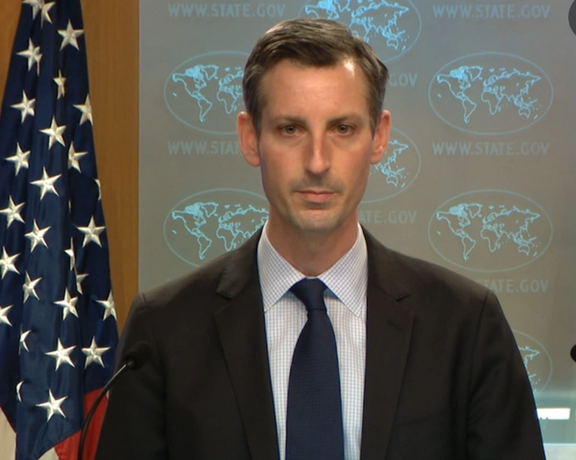
US State Department says this is the final decisive stage in nuclear talks with Iran to determine whether a mutual return to compliance with the JCPOA remains a possibility.
During his press briefing on Monday, department spokesperson Ned Price said, “we are going to be a bit more circumspect in terms of progress that we may be seeing on the ground in Vienna precisely because we are in the final stages of what is by any measure a complex negotiation with key stakeholders”.
Asked about the positive comments on the progress made in Vienna by European Union foreign policy chief Josep Borrell and by the Russia’s envoy, he said, “Our European partners as well as China and Russia – all of us urgently seek to achieve an understanding, but time is almost out. Time is very quickly ticking away”.
“We have been very clear that at the current rate of Iran’s nuclear advances, we have little time left, and that’s precisely because at a certain point very soon those nuclear advances will obviate the advantages that the JCPOA, as it was finalized in 2015 and implemented in 2016, initially conveyed”, he added.
Earlier in the day, Iranian Foreign Minister Hossein Amir-Abdollahian discussed with Borrell the latest status of the talks in Vienna, blaming the West for lack of an agreement in nuclear talks and emphasizing that Tehran will not back down from it "red lines."
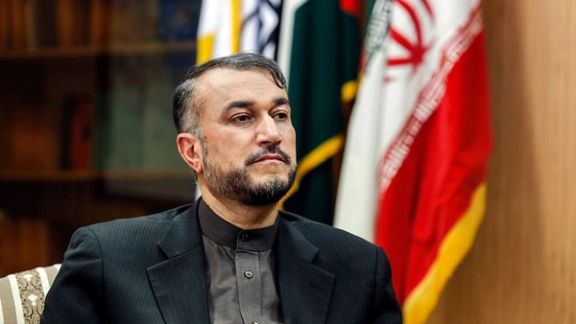
Iran's foreign minister blamed the West for lack of an agreement in nuclear talks in Vienna and stressed that Tehran will not back down from it "red lines."
Iranian Foreign Minister Hossein Amirabdollahian discussed with European Union foreign policy chief Josep Borrell the latest status of the talks in Vienna, Iran's foreign ministry said in a tweet on Monday.
Amirabdollahian said "a lack of serious will on the part of the West to reach a good and credible agreement in Vienna has led to unnecessary prolongation of the talks," the ministry added.
Amirabdollahian also stressed in the call that Iran will not back down from its red lines.
Iran interrupted the negotiations last June for five months as it said its new government needed time to organize. After returning to talks in late November, it demanded to renegotiate issues already agreed upon in the first six rounds of talks from April to June.
Reuters quoted an Iranian official on Monday that Tehran is demanding 300 more US sanctions to be lifted in addition to nuclear-related ones that Washington has already indicated ready to remove.
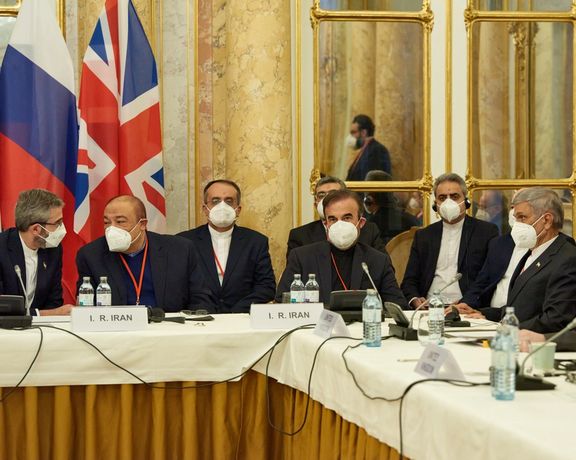
A senior Iranian official commenting on nuclear talks has said, "some 30% of difficult issues remain to be resolved but it is possible to reach a deal by early March".
A Western diplomat also said, "reaching a deal is possible around early March, if all goes well," Reuters has reported. US officials have implied an unofficial deadline to reach agreement by the end of February.
After eight rounds of talks, key bones of contention include Iran’s demand for a US guarantee of no more sanctions or other punitive steps in future, and how and when to restore verifiable restrictions on Iran’s nuclear activity.
A second Iranian official said Tehran was also insisting on being able to seal and store its advanced centrifuges inside Iran, rather than dismantling and sending them abroad, as Western powers have called for.
He said Iran further wants the removal of some 300 extra sanctions on Iranian entities and individuals not related to the nuclear deal.
US President Joe Biden's administration has said it will remove curbs inconsistent with the 2015 pact if Iran resumes compliance with it, implying Washington would leave in place sanctions imposed under terrorism or human rights measures.
US officials have said the Biden administration cannot guarantee that a US government would never renege on the agreement because it is classified as a non-binding political understanding, not a legally binding treaty.
Reporting by Reuters
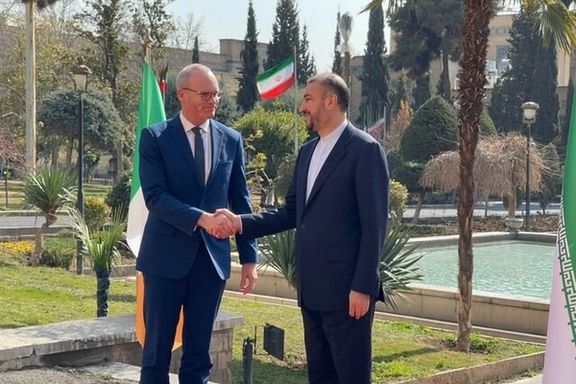
Iran's foreign minister has said Tehran is in a hurry to reach a nuclear deal in Vienna, although it suspended talks for about five months in 2021.
“It would be better for us to reach a deal today, rather than tomorrow”, he said, adding that “we're in a rush for achieving a deal, but a good one that serves our national interests”.
Hossein Amir-Abdollahian made the remarks on Monday during a joint press conference with his visiting Irish counterpart Simon Coveney.
Amir-Abdollahian said, “West must stop playing with the issue of time and text” and called on the other parties to work towards a swift deal, which is something all the other participants were attributing to Iran.
Before the volte-face today, Iran had reiterated that it wouldn’t accept any timeframe for the talks while other sides accused the Islamic Republic of wasting time so that it stockpiles enough fissile nuclear material to be able to make a nuclear bomb.
Critics said that one of Iran’s strategies to prolong the negotiations was its insistence on maximalist demands, including the lifting of all Trump era sanctions, including those not related to the nuclear issue.
Earlier in the day, foreign ministry spokesman Saeed Khatibzadeh said Tehran is awaiting a political decision by Washington on nuclear talks and reiterated that a deal is possible "tomorrow" if the US provides guarantees.
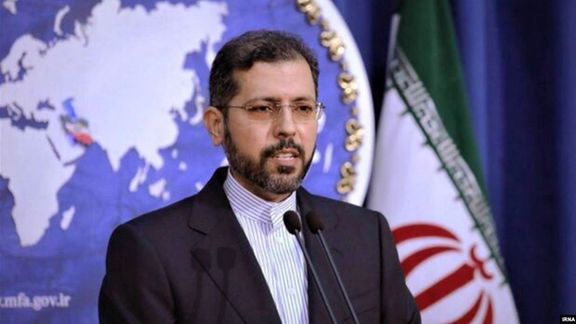
Iran's says it is awaiting a political decision by Washington on nuclear talks and reiterated that a deal is possible "tomorrow" if the US provides guarantees.
“There will be no need to [wait] until the end of February if the European and American sides respond to Iran's initiatives today,” spokesman Saeed Khatibzadeh told a press conference in Tehran. “We can announce an agreement in Vienna tomorrow…The agreement is awaiting the other side's political decisions.”
Khatibzadeh said Iran needed "concrete guarantees" that that the US would not again withdraw from the 2015 deal, the JCPOA (Joint Comprehensive Plan of Action) as it did under President Donald Trump in 2018.
The spokesman was referring to reports of informal briefings that the end of the month constituted a deadline, a notion Iran has rejected. Khatibzadeh said that Iran and remaining JCPOA signatories – China, France, Germany, Russia, and the United Kingdom – were "seeking to get guarantees from the US” over Washington lifting all sanctions incompatible with the JPCOA and the United Nations Security Council resolution 2231, which endorsed the nuclear agreement.
Khatibzadeh reiterated that such sanctions should be removed "irrespective of what they are called or false labels," referring to statements by Trump administration officials that sanctions under the rubric of ‘human rights,’ ‘links to the leader’s office,’ or other ‘labels’ were designed to complicate any subsequent attempts to restore the JCPOA.
Mohammad Marandi, media adviser to Iranian negotiators in Vienna, told Russia's Sputnik that it is too early to know whether the US would accept Iranian conditions. "There is a significant possibility that there will be an agreement...as we see some movement from the US and Europe,” he said. “But there is also a chance there won't. Everything will depend on Washington and on whether they really want it."
Marandi told Sputnik that Iran wanted a "proper verification process," meaning transparency over the removal of sanctions. He reiterated that despite its pledges under the JCPOA, the US even after signing the agreement maintained formal and informal sanctions that precluded Iran from benefiting fully from the agreement.
International sanctions imposed by the United Nations Security Council were removed in 2015 and both the United States and Europe complied by removing sanctions incompatible with the Joint Comprehensive Plan of Actions (JCPOA).
'Behind closed doors'
"In 2015, we made sure to implement the deal,” Marandi said. “It was [President Barack] Obama, who didn't. Behind closed doors, he told the Treasury and various firms not to work with us."
He did not offer any evidence for claiming Obama obstructed efforts to comply with JCPOA.
Ali Shamkhani, Iran’s top security, tweeted Sunday that a “US political decision to realize or refuse to accept the requirements of a credible and lasting deal based on the principles accepted in JCPOA can replace speculation." Shamkhani suggested in another tweet that he was not optimistic as “western parties” − presumably meaning the US and western Europeans − were evading real commitments.
Asked about Shamkhani's remarks at his press conference, Khatibzadeh said developments in Vienna had reached “a difficult stage” with “important and key matters that all sides are following up closely.”
A source familiar with the talks told Iran International Monday that Iran was making “unrealistic demands,” which if pressed meant the “talks are bound to fail.” But Russia's envoy to the talks, Mikhail Ulyanov, wrote in a tweet Sunday that a meeting between remaining JCPOA participants without Iran had confirmed “significant progress has been made in the course of negotiations.”
An Iranian source familiar with the talks told Iran's Press TV Sunday that “rumors” were unfounded that the US would engage directly with Iran in the JCPOA Joint Commission. Tehran has insisted that Washington cannot take part in JCPOA structures until it returns to the agreement.